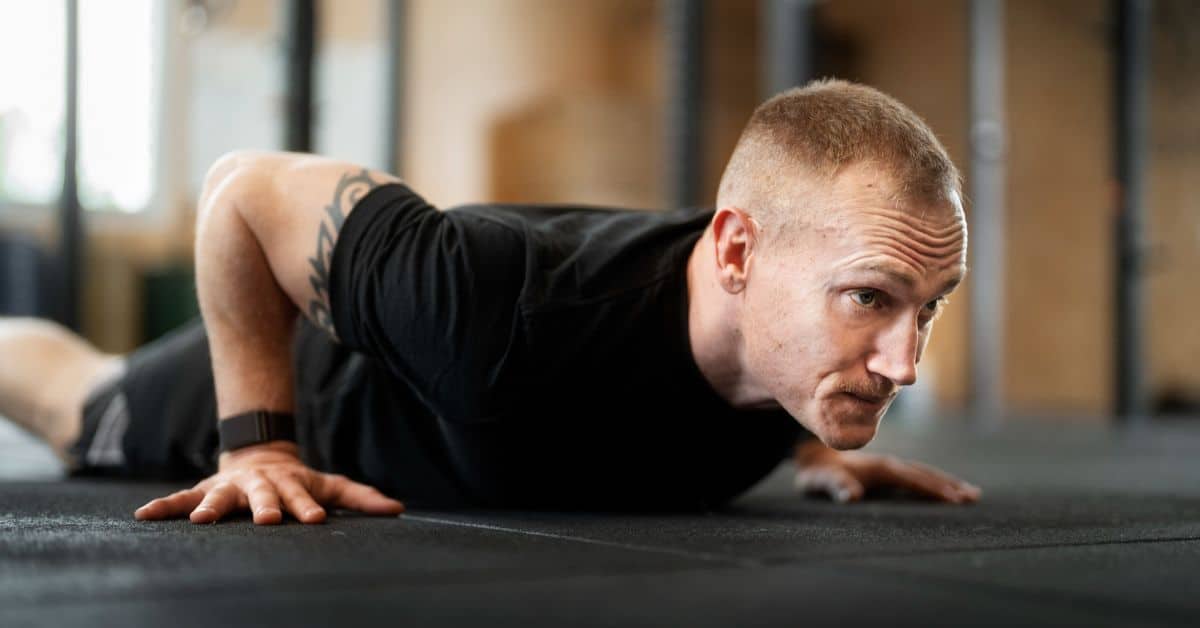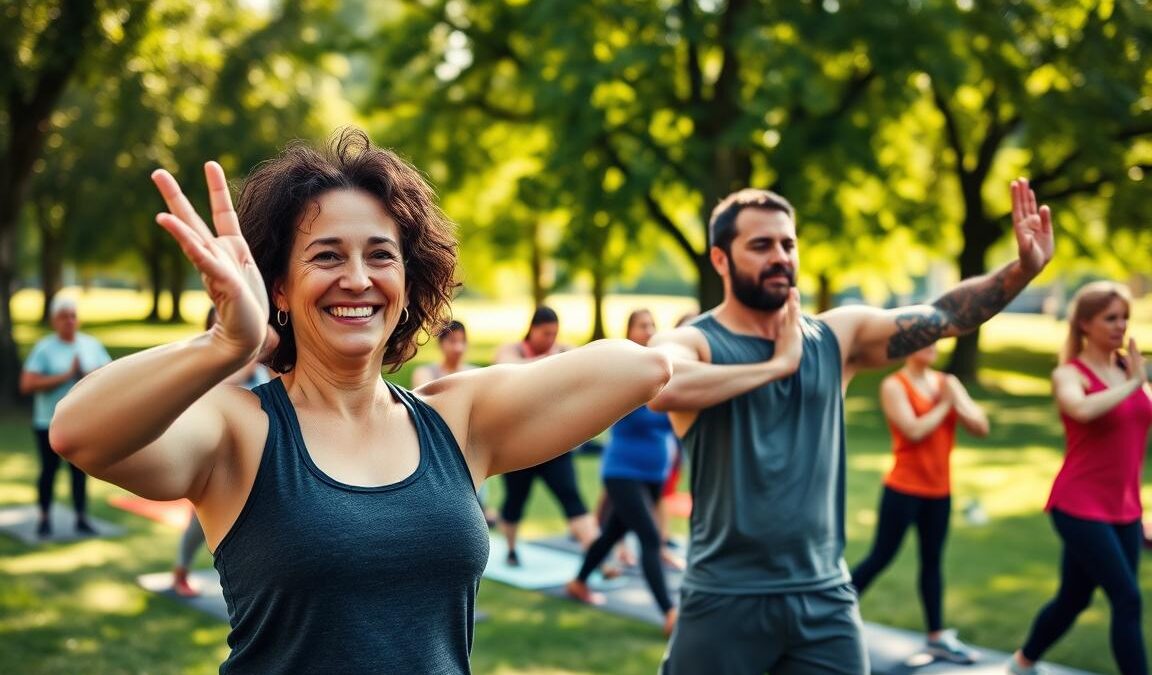
What Muscles Do Burpees Work?
The burpee is a dynamic full-body exercise that combines strength and cardio training. It was originally developed as a military fitness test but has now become a staple of many workout routines. Therefore, determining what muscles burpees work is crucial for anyone trying to maximize their fitness routine and ensure they’re hitting the right muscles.
Burpees can improve your overall fitness, from muscle strength to cardiovascular endurance. The exercise engages multiple muscle groups simultaneously, making it a great full-body workout. In this article, we’ll look at what muscle groups do burpees work so you can incorporate them into your workout. Let’s dive in.
What is a Burpee?
Burpees are a high-intensity, full-body exercise that combines strength and cardio in one movement. They originated as a military fitness test and have since become popular in many workout routines. A standard burpee consists of four main movements: a squat, a jump, a push-up, and another jump.
First, stand with your feet shoulder-width apart. Squat down and place your hands on the floor in front of you. Next, jump your feet back to assume a plank position. Perform a push-up, keeping your body straight. After the push-up, jump your feet forward to return to the squat position. Finally, jump up explosively with your hands reaching toward the ceiling.
Several variations of burpees are also available to challenge different fitness levels. For beginners, half burpees or step-back burpees are great options. Advanced variations include adding a box jump or a tuck jump at the end.
What Muscles Do Burpees Work?

Burpees are a comprehensive exercise that targets multiple muscle groups throughout the body. Such as:
- Quadriceps: The quadriceps are heavily engaged during the squat and jump phases of a burpee. They extend the knee and provide the power for jumping.
- Hamstrings: The hamstrings work alongside the quadriceps during squatting and jumping. They help bend the knee and extend the hip.
- Glutes: The gluteal muscles, or glutes, are essential for hip extension and stability. They provide power and maintain balance during squats and jumps.
- Calves: When pushing off the ground, the calf muscles, comprising the gastrocnemius and soleus, are engaged. They help with ankle extension and contribute to explosive movements.
- Chest (Pectorals): The pectoral muscles are primarily engaged during the push-up phase. They help push your body away from the ground, building upper body strength.
- Shoulders (Deltoids): The deltoids are activated during the push-up and jump phases. They assist in lifting your body and stabilizing the shoulder joints.
- Triceps: The triceps work during the push-up phase of a burpee. They help extend the elbow, playing a crucial role in pushing your body up.
- Abdominals: The abdominal muscles stabilize the body throughout the burpee. They help maintain proper form, especially during the plank and push-up phases.
- Obliques: The obliques assist with rotational stability. They help keep your body aligned during the various movements in a burpee.
- Lower Back Muscles: The lower back muscles support the spine and help maintain posture. They are engaged throughout the exercise to ensure stability and prevent injury.
What Muscles Do Navy Seal Burpees Work?
Navy Seal burpees are an advanced variation that intensifies the workout. They target all the muscles regular burpees do but with added emphasis. The quadriceps, hamstrings, glutes, and calves power the leg movements. The chest, shoulders, and triceps are engaged during the push-up and additional plank exercises. The core is also heavily activated throughout the movement to maintain stability and control, further enhancing overall strength. Similar to the muscles targeted by swimming, Navy Seal burpees engage a wide range of muscle groups, promoting both muscular endurance and cardiovascular fitness. This makes them an excellent full-body exercise for building functional strength and stamina.
Through dynamic movements, the abdominals, obliques, and lower back stabilize the body. The variation boosts upper body and core engagement for a more comprehensive workout, enhancing strength, endurance, and coordination.
What are the Benefits of Burpees?
Burpees combine strength, endurance, and cardiovascular conditioning in one exercise. They work multiple muscle groups, from your legs to your core, and improve overall fitness. Whether you’re a beginner or an athlete, burpees can improve your performance and burn calories. The following are key reasons why burpees are great for exercise.
Full-Body Workout
Burpees engage your entire body, from the legs and arms to the core. This movement builds strength and endurance simultaneously. With each repetition, you’ll work on major muscle groups like the chest, shoulders, and glutes, improving overall muscle tone and definition.
Cardiovascular Conditioning
Burpees elevate your heart rate quickly, making them a great cardio exercise. By repeatedly transitioning between standing and squatting, you can boost cardiovascular endurance. This helps improve stamina and reduces the risk of heart disease over time.
Fat Burning and Weight Loss
Due to their high-intensity nature, burpees burn a significant amount of calories, making them effective for weight loss. When performed in quick, successive sets, they elevate your metabolism, helping you burn fat even after your workout ends.
No Equipment Needed
One of the best parts of burpees is that you can perform them anywhere. You don’t need any special equipment, making burpees a convenient exercise option. Whether at home, outdoors, or at the gym, they can fit into any routine.
Improved Coordination and Balance
Burpees involve multiple movements in quick succession, which requires good coordination. As you improve your form, you’ll gain better balance and agility. This benefit is especially useful for athletes and those engaged in sports that require precise movements.
Time-Efficient
Burpees are time-efficient, providing maximum benefits in a short period. You can complete an intense workout in just a few minutes. This is great for people with busy schedules who want to stay fit without long, drawn-out sessions.
Boosts Functional Fitness
Because burpees mimic real-life movements like squatting, jumping, and standing up quickly, they improve functional fitness. This translates to better performance in daily activities, from climbing stairs to lifting objects.
Enhances Mental Toughness
The physical challenge of burpees can build mental toughness. Pushing through fatigue and completing sets develops resilience, which can improve focus and determination in fitness and other areas of life.
How to Do a Proper Burpee

Mastering the correct form for a burpee ensures you get the full benefits while minimizing the risk of injury. It’s a dynamic exercise, but with attention to detail, you can perform burpees safely and effectively. Here’s a step-by-step guide on how to do a proper burpee.
1. Start in a Standing Position
Begin by standing upright with your feet shoulder-width apart. Engage your core and keep your back straight. This is your starting position before transitioning into the next movements.
2. Drop into a Squat
Bend your knees and lower your body into a squat position. Place your hands on the floor in front of you. Keep your back flat and ensure your knees don’t extend past your toes. This protects your joints and keeps the movement stable.
3. Kick Your Feet Back
With your hands firmly on the ground, kick both feet back into a plank position. Your body should form a straight line from head to heels. Keep your core tight, and avoid letting your hips sag. This position engages your abs, shoulders, and back.
4. Perform a Push-Up
Lower your chest to the floor by bending your elbows and completing a push-up. If you’re a beginner, you can skip this step or modify it by dropping your knees. The push-up works your chest, arms, and shoulders, adding strength training to the movement.
5. Jump Your Feet Forward
After the push-up, jump your feet forward toward your hands. Return to the squat position, keeping your core engaged. Land softly to reduce the impact on your joints. This transition helps maintain the fluidity of the exercise.
6. Explode Into a Jump
From the squat, explosively jump up into the air, extending your arms overhead. Reach for the ceiling and land softly on the balls of your feet. This jump adds a plyometric element, improving power and cardio endurance.
7. Repeat
After landing, immediately drop back into the squat position and begin the next repetition. Maintain a steady rhythm and proper form throughout each movement. Aim for smooth transitions to get the most out of each set.
FAQs
What Muscles Do Military Burpees Work?
Military burpees effectively target multiple muscle groups. They engage the quadriceps, hamstrings, glutes, and calves during the jump and squat. The upper body benefits as well, working the chest, shoulders, and triceps during the push-up phase.
Core muscles, including the abdominals and obliques, stabilize the body throughout the movement. Overall, military burpees provide a comprehensive workout for strength and endurance.
Do Burpees Burn Fat or Build Muscle?
Burpees are effective for both fat-burning and muscle-building. They elevate your heart rate, which aids in calorie burning and fat loss. The high-intensity nature of burpees also promotes metabolic conditioning.
Additionally, burpees engage multiple muscle groups, helping to build lean muscle mass. Incorporating burpees into a regular workout routine can enhance overall fitness, making them valuable exercises for achieving both goals.
Does Burpees Flatten Your Stomach?
Burpees can help flatten your stomach, but it’s important to understand how. They engage your core muscles, including the abs, during every movement. By combining strength training and cardio, burpees burn a high number of calories, which contributes to fat loss.
However, spot reduction—targeting fat loss in one area like the stomach—is not possible. To flatten your stomach, you’ll need to reduce overall body fat through a combination of exercises like burpees and a balanced diet.
What Will 100 Burpees a Day Do?
Doing 100 burpees a day improves cardiovascular fitness, burns fat, and builds full-body strength. This intense exercise targets your legs, core, chest, and arms, leading to better muscle tone and endurance.
It also burns a high number of calories, which supports fat loss. Additionally, it enhances coordination and mental toughness, making it a great way to challenge yourself both physically and mentally in a short, time-efficient workout.
Read More: How Many Calories Should I Eat to Build Muscle
Conclusion
Now you are aware of what muscles do burpees work and their key benefits. This full-body exercise engages the legs, upper body, and core, making it a powerful addition to any fitness routine. The muscle engagement promotes strength, endurance, and fat loss whether you’re doing standard burpees or advanced variations. Burpees can help you achieve a comprehensive fitness transformation and achieve your health goals.



